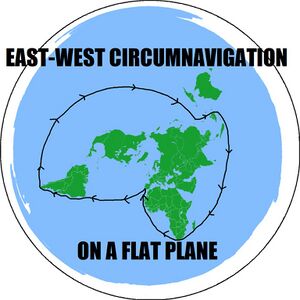Difference between revisions of "Frequently Asked Questions"
| Line 36: | Line 36: | ||
A: [coming soon] | A: [coming soon] | ||
| − | |||
| − | |||
<div class="mw-customtoggle-myToggle5" style="cursor:pointer; color:blue">'''Q: If the Earth is flat, why isn't it always daytime everywhere?''' [+/-] Click here to toggle]</div> | <div class="mw-customtoggle-myToggle5" style="cursor:pointer; color:blue">'''Q: If the Earth is flat, why isn't it always daytime everywhere?''' [+/-] Click here to toggle]</div> | ||
| Line 45: | Line 43: | ||
When we leave these presuppositions behind, what we actually observe on Earth is that the sun illuminates different parts of the plane at different times. If you take a flashlight and point it at your bedroom floor at night, it only illuminates one part of the carpet at a time, and the rest of the floor is in shadow. In the same way, a close and local song circling overhead would only illuminate one part of the world before moving on to another part. Here is a possible demonstration of how that might look, based on what we actually observe. The globe model requires complicated mathematical calculations based on inaccurate numbers and presuppositions. Indeed it is much more difficult to explain the path of the sun when using the hypothetical globe model than it is to explain the reality of what we observe on a flat and stationary Earth. | When we leave these presuppositions behind, what we actually observe on Earth is that the sun illuminates different parts of the plane at different times. If you take a flashlight and point it at your bedroom floor at night, it only illuminates one part of the carpet at a time, and the rest of the floor is in shadow. In the same way, a close and local song circling overhead would only illuminate one part of the world before moving on to another part. Here is a possible demonstration of how that might look, based on what we actually observe. The globe model requires complicated mathematical calculations based on inaccurate numbers and presuppositions. Indeed it is much more difficult to explain the path of the sun when using the hypothetical globe model than it is to explain the reality of what we observe on a flat and stationary Earth. | ||
| − | https://www.youtube.com/watch?v=b_ppPXChyTo&t=41s https://tenor.com/view/flatearth-gif-8521428 [[The_Sun|read more ...]]</div> | + | <youtube>https://www.youtube.com/watch?v=b_ppPXChyTo&t=41s</youtube> |
| + | https://tenor.com/view/flatearth-gif-8521428 [[The_Sun|read more ...]]</div> | ||
Revision as of 17:05, 12 March 2021
Q: If the Earth is not spherical, why do boats disappear over the horizon?
A: [coming soon]
Q: Didn't Eratosthenes use sticks and shadows to prove that the Earth is ball-shaped?
A: [coming soon]
When we leave these presuppositions behind, what we actually observe on Earth is that the sun illuminates different parts of the plane at different times. If you take a flashlight and point it at your bedroom floor at night, it only illuminates one part of the carpet at a time, and the rest of the floor is in shadow. In the same way, a close and local song circling overhead would only illuminate one part of the world before moving on to another part. Here is a possible demonstration of how that might look, based on what we actually observe. The globe model requires complicated mathematical calculations based on inaccurate numbers and presuppositions. Indeed it is much more difficult to explain the path of the sun when using the hypothetical globe model than it is to explain the reality of what we observe on a flat and stationary Earth.
https://tenor.com/view/flatearth-gif-8521428 read more ...
Q: How do you have time zones without the globe model?
A: [coming soon]
Q: If the Earth measures flat, why can't we see forever?
A: [coming soon]
Q: Does gravity exist?
A: [coming soon]
Q: Don't eclipses prove the globe?
A: [coming soon]
Q: If the Earth is flat, how do you explain the Coriolis effect?
A: [coming soon]
Q: Why is Earth the only flat planet?
A: [coming soon]
Q: What is underneath the Earth?
A: [coming soon]
Q: Why would they lie?
A: [coming soon]


